2022-23 Philosophy Job Market Report (guest post)
How has the 2022-23 philosophy job market looked so far?
In the following guest post, Charles Lassiter (Gonzaga) takes a look at the data, sharing information about trends in the number and types of jobs on offer, and about which areas of specialization are most sought after by hiring institutions.
(A version of this post previously appeared, in two parts, at Professor Lassiter’s blog.)

[photo by J. Weinberg]
The 2022-23 Philosophy Job Market So Far
by Charles Lassiter
Hey friends. We’re going to take a look here at the primary cycle (July 1 – December 30). This is when most job posting happens. Here’s a look at postings across all job types:
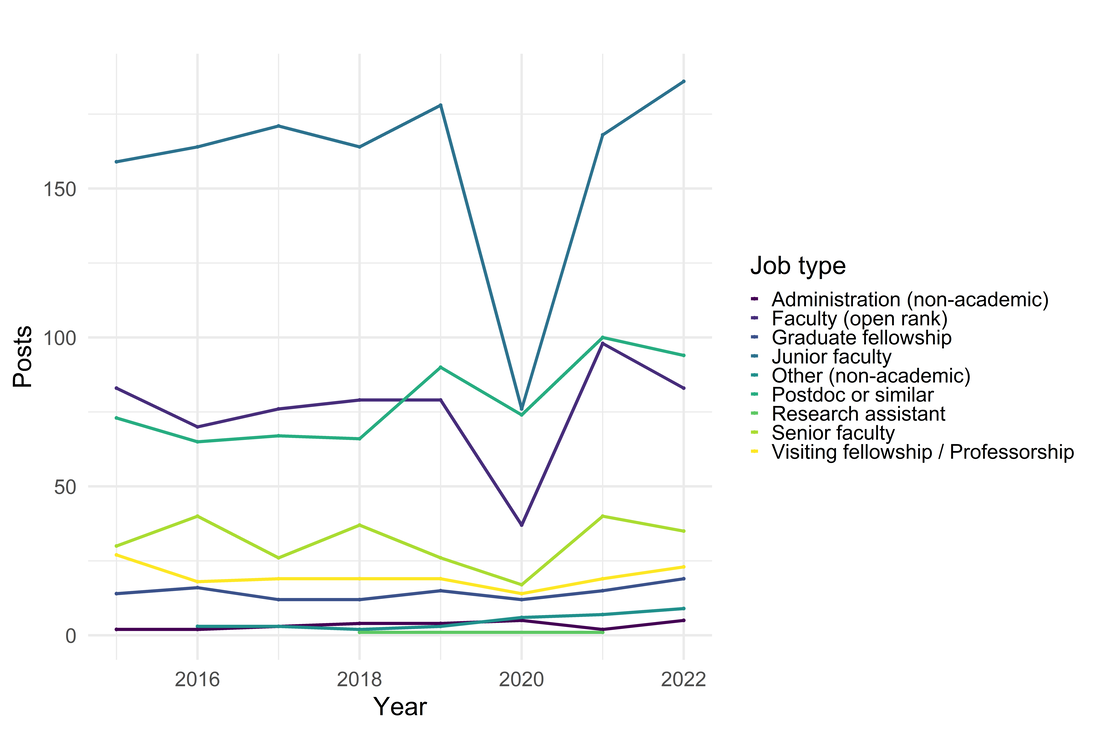
Remember 2020? Oof da that was a rough year. Anyway, we’re trending a bit higher than usual on junior posts relative to previous years. In fact, the trend for junior posts over the last seven years has been more jobs. Open rank, postdoc, and senior posts are down slightly but still within a normalish range historically. Visiting fellowships are up slightly, but still within a normal range. In case you want the numbers for junior, postdoc, open rank, and non-academic, here are those:
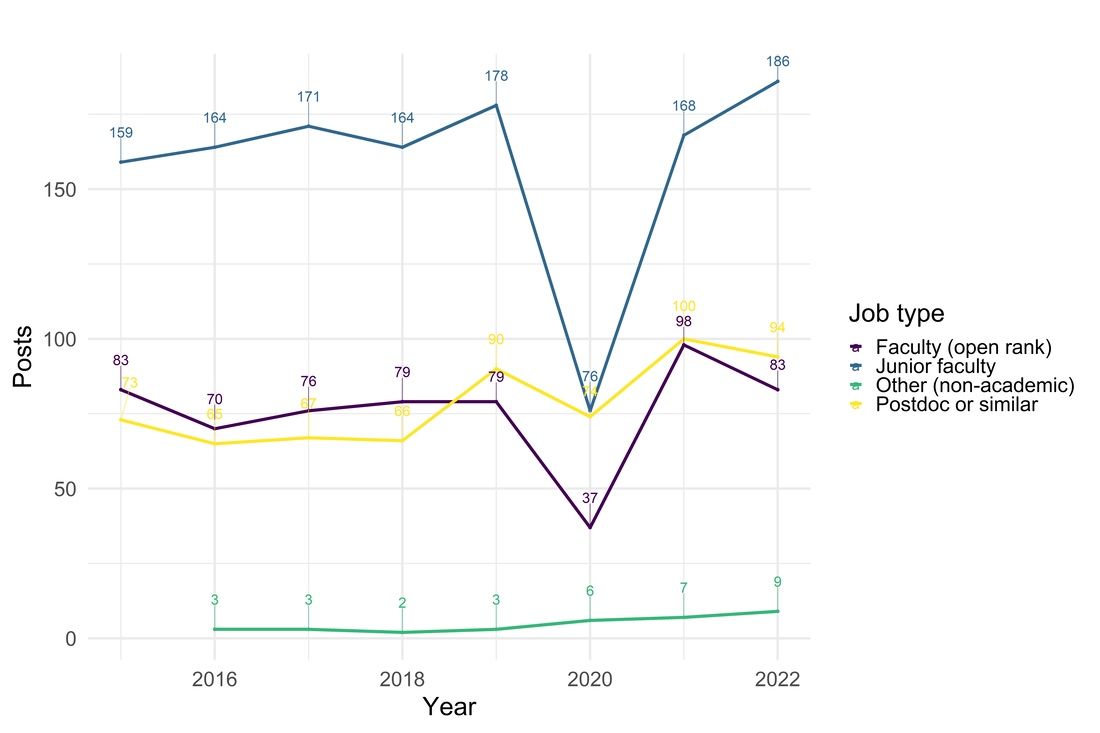
Let’s zoom in on junior positions:

This one is tricky to interpret. Trend lines (not included) suggest that the TT market has been trending downward over last 7 years, but that includes 2020, which is an outlier. Excluding 2020, we find that the market is trending towards having more jobs. Even so, it’s not a huge trend. The NSF’s Survey of Earned Doctorates reports that there were 399 new PhD’s in philosophy in 2021. So even though it’s an upwards trend, it’s not moving fast enough to accommodate all the new PhD’s.
So there you have it. The job market isn’t looking all that different from pre-2020 levels. Some slight increases but none significant enough to breathe a sigh of relief heading into the market. I’ve said it before and I’ll say it again: the American Philosophical Association and grad programs need to put more time and energy into non-academic career paths.
What about areas of specialization (AOS)? Here’s the big picture:
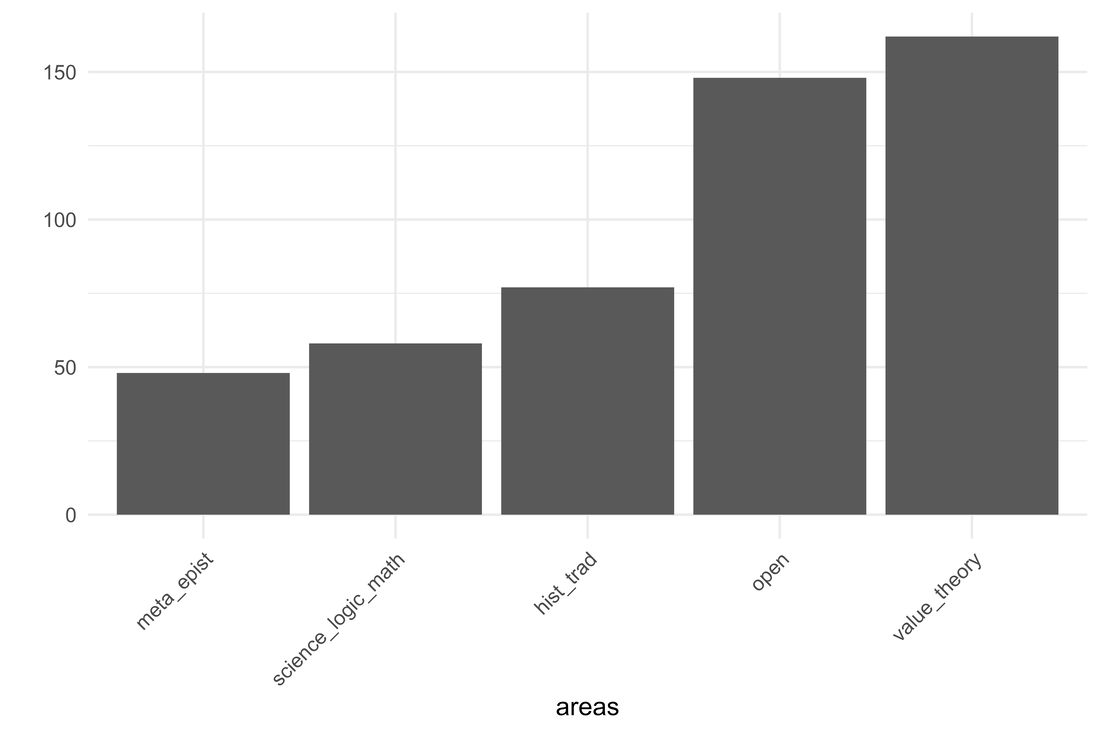
A note on method: In cases where multiple areas were listed, I’ve counted those separately. So this isn’t a tally of all jobs on the market. Rather, it’s a tally of all the jobs advertised in one of the five main categories on Philjobs. So (e.g.) there are a hair under 50 jobs in metaphysics/epistemology. But some ads listed meta/epist or history of phil as the AOS they were looking for. Here, each of those was counted separately. I opted for this method of counting because I’m assuming that any disjunctions in AOS’s for job ads can draw from two different applicant pools: that is, that AOS pools are exclusive. (I know this isn’t always true but go with it as a simplifying assumption for the model.) For (for instance) a job ad looking for an epistemologist or an ethicist gets listed here as a job for an epistemologist and as a job for an ethicist. So if Jack is an epistemologist and Jill is an ethicist, the job ad counts as a listing for Jack and for Jill individually. In a nutshell, I’m counting jobs by AOS from the point of view of job seekers under the assumption that multiple AOS’s have mutually exclusive candidate pools.
Let’s zoom in on a few of these, starting with value theory:
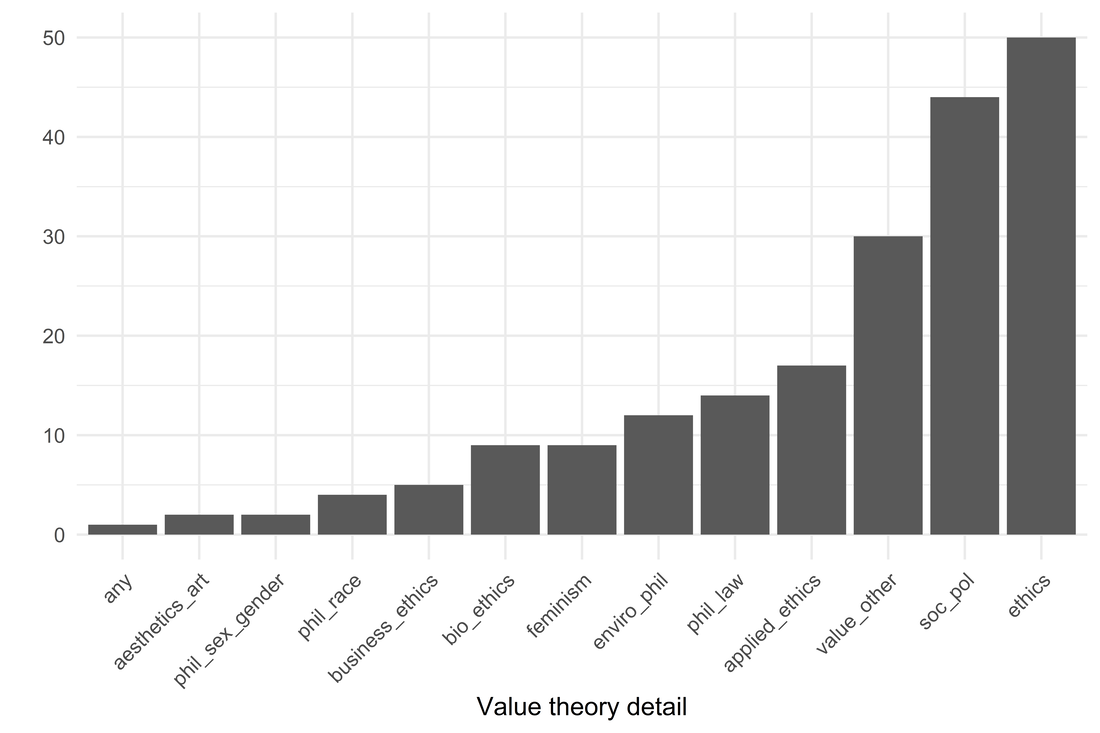
Ethics dominates, followed by social and political philosophy. We’ll get to “other” in a moment. Sadly, phil of art is at the bottom with two ads.
Value_other is a catch-all for specific areas that don’t fit neatly into any of the other categories. It was a hodgepodge of seemingly grant-specific areas, e.g. citizenship, media ethics, etc. But there were 3 ads for AI ethics and 2 for ethics and tech. So there are more job ads for ethics and tech/AI than there are for phil of art or phil of sex and gender.
Let’s take a closer look at history and traditions to see what’s up there:
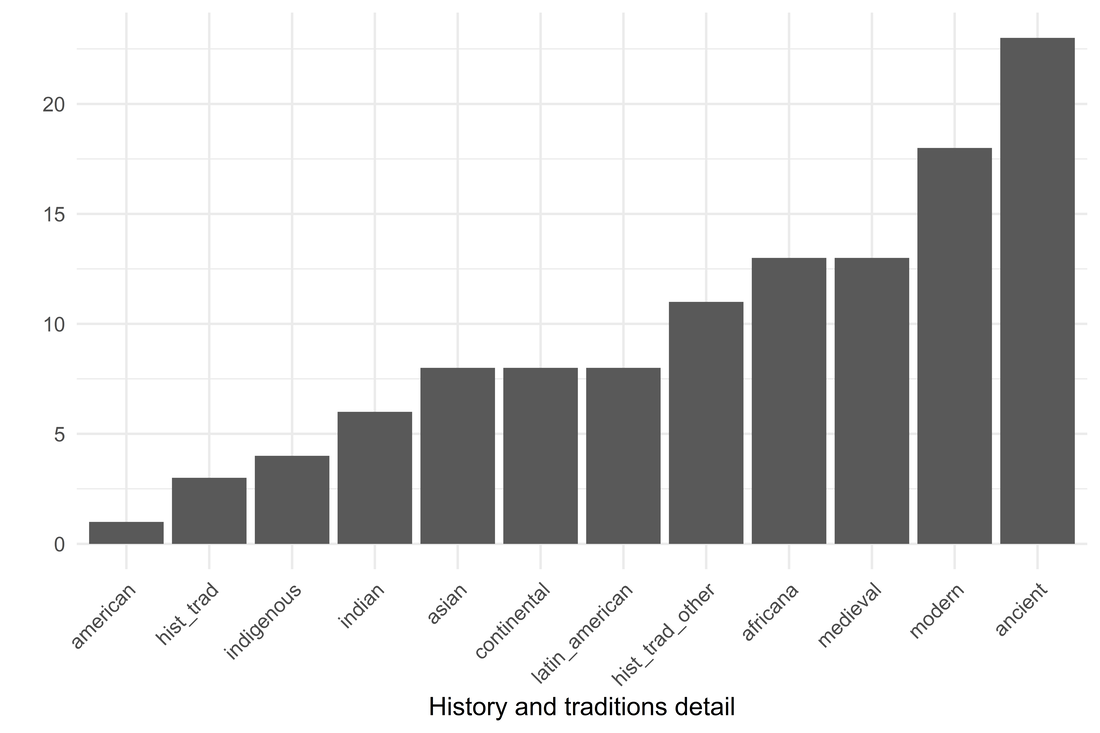
Carving up this data was a bit trickier. Some ads just had “history of philosophy” without any detail. Others said “non-Western”. For the former, I listed ancient, medieval, and modern as covering a generic “history of philosophy.” And for non-Western, I listed Asian, Africana, Indigenous, Indian, and Latin American as proxies. So again, keep in mind that these aren’t total job counts but rather (roughly) jobs for which one could apply if one were an expert in (say) ancient or Latin American phil. Given these assumptions, ancient is in greatest demand.
Non-western traditions are on the map, but not in huge demand. “Africana” showed up in 13 ads while “indigenous” showed up in four. Though it’s worth noting that Africana is in higher demand than a number of subcategories in value theory.
Now science, logic, and math:
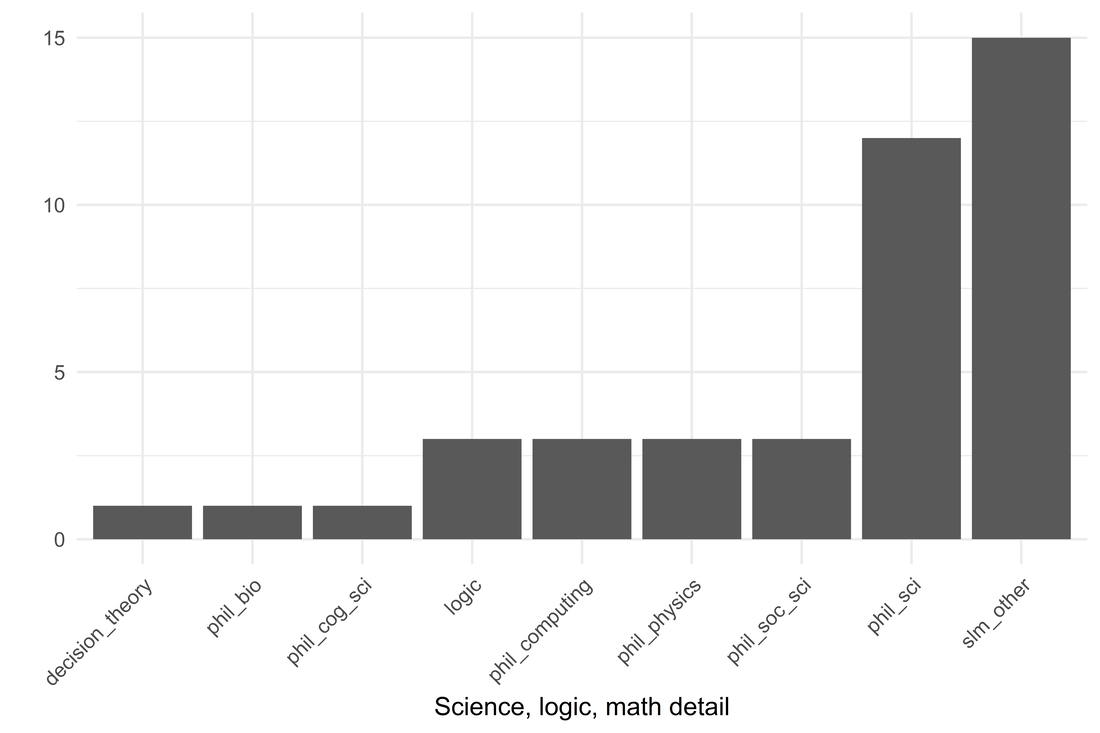
Philosophy of science is leading the way with relatively few opportunities for other subfields. What’s up with the other category? This is a grab bag of: history of science or medicine or technology; AI; the metaphysics of science; postdoc ads that are too specific to classified anywhere else (e.g. a project on episodic memory).
Lastly, metaphysics and epistemology:
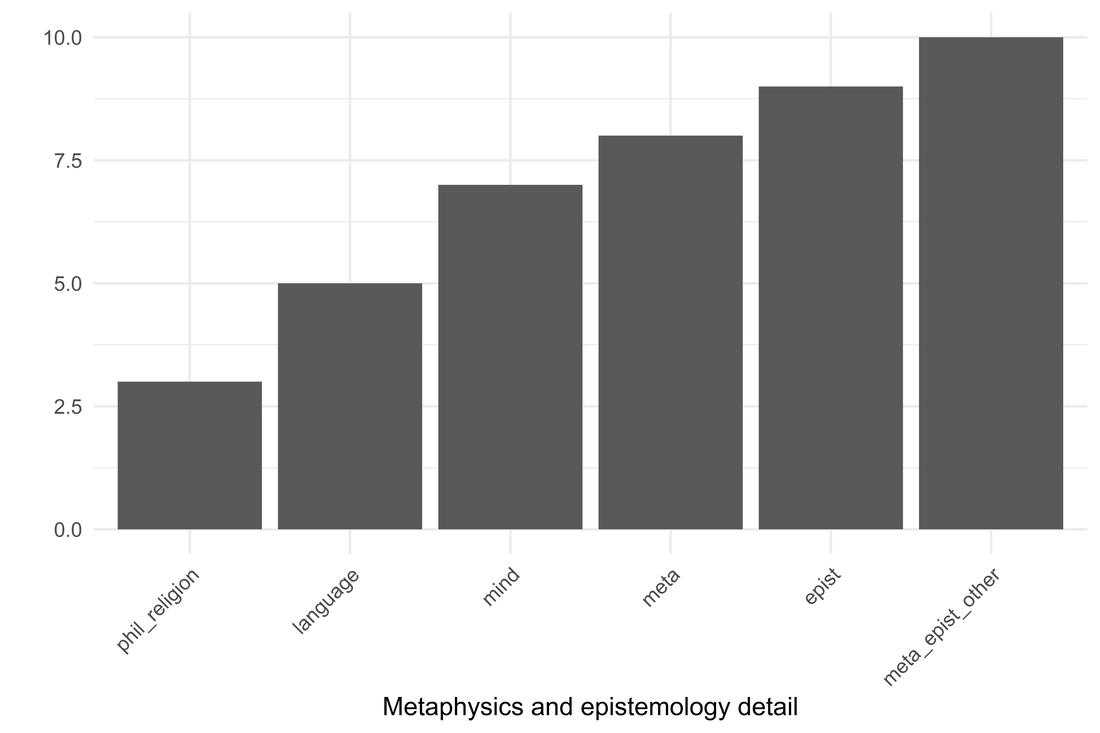
Seven jobs for philosophers of mind? Nine for epistemologists? Yeesh. what’s in the “other” category? Five philosophy of technology positions, a social epistemology, and a couple of animal cognition.
What’s interesting about this from my view is when there are repeated instances in the “other” category. This suggests the emergence of an important subfield that isn’t yet counted among the standard options, or at least not in any obvious way. Decision theory has a subcategory on Philjobs, but philosophy of technology doesn’t. Nor does history of science/STS, even though phil tech and history of science each had more ads than decision theory. I’d say that history of science/STS and phil tech are established subfields. A colleague of mine who works in phil tech once described it as fringe. Kirby, if you’re reading this, I don’t think it’s fringe any more.
Let’s now filter AOS by junior positions and post-docs. Here’s what that looks like:
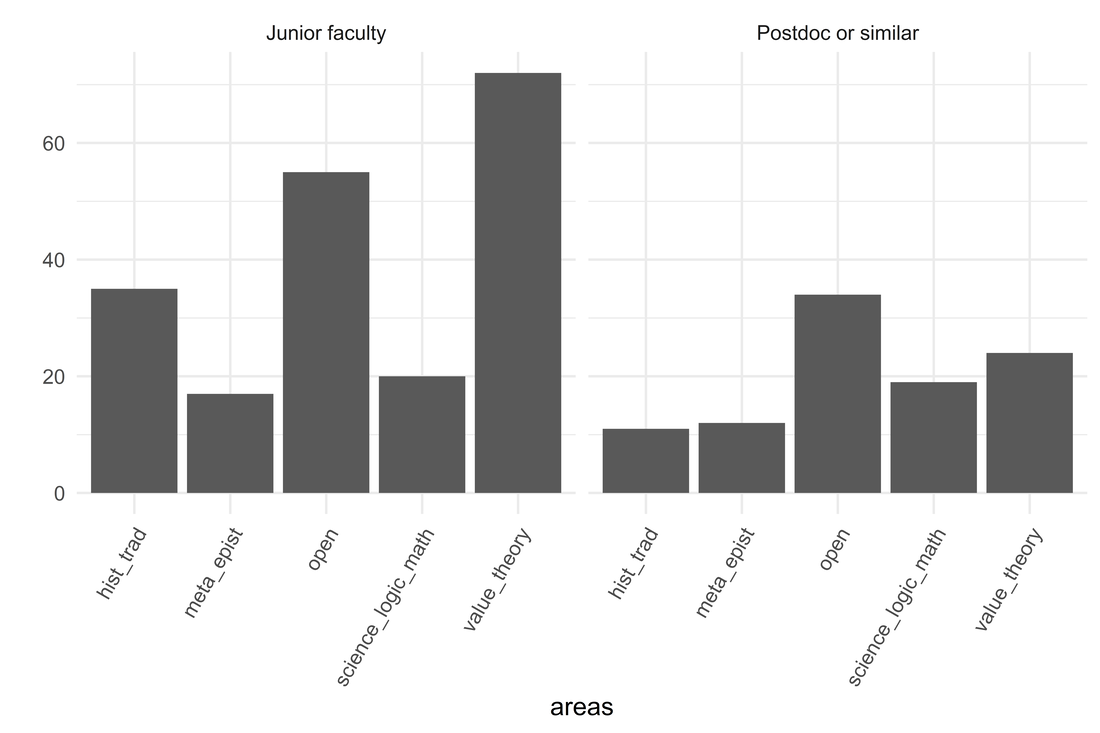
So trends for junior positions largely follow that of all positions. Most are in value theory, followed by open and history/traditions. Things are a bit different for postdocs, with the greatest number of positions being advertised as open.
In talking with my friend Nader Shoaibi, I wonder if digging into the details makes the picture a bit drearier than the numbers here say. I’ll use myself as a test case. If I were going on the market, I’d apply for open jobs and jobs in philosophy of mind. I’d apply for everything but would really be looking at tenure-track jobs—that’s where the security is at. Filtering for those values, there are 36 jobs: 33 open and 3 in philosophy of mind. I got my PhD at Fordham, so let’s be realistic about my job prospects. I know, I know… that one person went from Oklahoma to Harvard. Fantastic for them but clearly an outlier. At a non-prestigious university, I can cut the Ivies and lots of R1s from the list. And let’s take jobs outside the US off the table because I’m not a superstar and a university outside the US is unlikely to pay for the costs of hiring a foreigner. That leaves me with 16 openings, all advertised as open.
That’s all to say that the numbers don’t look great in the big picture and things only go downhill when getting into the weeds.
I’m hoping to get some help soon for looking at AOS trends since 2015. It’s a lot of data to clean. But I’ll be sure to let you know when that’s available.
As always, if there are any other analyses you’re interested in, please let me know!

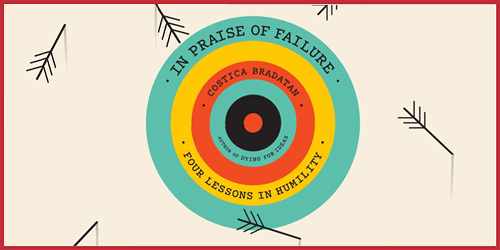

“Philosophy of science is leading the way [in ‘science, logic and math’] with relatively few opportunities for other subfields.”
I think this data is misleading. While you do sometimes see a job advertised specifically in philosophy of a particular science (e.g. philosophy of physics) it’s more common to have a more general ‘philosophy of science’ ad, to which philosophers in various more specific areas of philosophy of science apply. So to a significant degree that ‘philosophy of science’ job group is a catch-all for jobs that a large fraction of the whole science-AoS applicant group can apply for.
ah, ok. thanks for the info. so if i’m a philosopher of biology, i’m applying for the phil sci jobs as well as the phil bio ones. i’ll be sure to keep that in mind the next time i’m working with the data.
This is really helpful data to collect and it’s a lot of work to clean it up like this. Thanks!
That said, I did want to quibble about one thing at the end.
“And let’s take jobs outside the US off the table because I’m not a superstar and a university outside the US is unlikely to pay for the costs of hiring a foreigner.”
I’m not sure the presupposition here is correct. I feel I’ve seen plenty of places hire from non-prestigious overseas universities.
And if it’s a small country, and especially if it’s a small non-EU country, most of the applicant pool is going to be foreign, so it would be very unlikely that they would pre-emptively rule out all foreigners.
Second this. Always enjoy your posts Charlie. I’ll say that at least speaking for the Netherlands, there is no cost for universities to hire foreigners that I am aware of. Except for a €300 residence permit application. The Dutch gov. even gives a special tax break for so-called “knowledge workers” that immigrate. Our department has somewhere around 5 or 6 North Americans. And speaking as someone who got their PhD from a very similar place as Charlie 😉, my impression of Europe academia in general places less of an emphasis on “pedigree” compared to the US market. Search committees are more interested things, like publications, teaching, and collegiality.
Just to add to this–at least outside of Oxbridge-type-places, it seems to me (I’ve been doing placement for many years now for a non-elite PhD program…) that non-US universities are much less likely to be prestige-biased and also more likely to make decisions (sometimes for the better, sometimes for the worse!) based on things like number of publications, number of publications in high-prestige journals, etc.–so these seem like precisely the jobs that someone from a non-elite US program should be applying to if they are research-focused/publish a lot (assuming they are willing to live outside the US). I’m sure there’s lots of variation here though, and that some places are prestige biased, but altogether I think it is truly terrible advice for students from non-elite programs to not apply internationally because they aren’t seen as superstars.
Also just wanted to say thanks so much for this post, it’s really helpful and interesting!
thanks, for the info! though to clarify: I’m not offering advice on applying to places. Charlie from 10 years ago wasn’t as pessimistic as the Charlie of today: I applied to everything that wasn’t a moonshot (e.g. Princeton, NYU).
thanks Emily! i appreciate the “inside scoop” from someone with a very similar pedigree 🙂
thanks for the insight! your point is well-taken. I’m working with my small pool of anecdotal evidence. I imagine Carolyn Dicey Jennings would have the data to begin figuring out if country of origin significantly affects one’s prospects of getting a job
…I’m not a superstar and a university outside the US is unlikely to pay for the costs of hiring a foreigner.”
To add to what Brian Weatherson says above, the “cost of hiring a foreigner” varies a lot from country to country, as might the amount of the cost that’s put on you (or legally can be put on you.) So, when I moved to Australia to teach, I paid for the visas (and health checks) for both myself and my wife. It wasn’t cheap! But, it was possible. (When I needed to get a new visa two years later, I was able to negotiate to have the university pay for it, in exchange for a promise to not leave for a few years, or to re-pay the amount if I did.) (Note that officially in the US the employer is supposed to pay for the visa sponsorship fees, but in fact they often violate this rule. It’s just not a rule in Australia, and probably not in other countries, too.) The chances of a “foreigner” being hired in different countries varies quite a bit from place to place. If you think you’d honestly like to live and work in the place where the job is, I’d not rule out applying (but it is likely that if expenses for moving and/or visas are paid, you’ll have to agree to work at the university for a certain amount of time or pay back some of that money.)
This is very helpful, thanks!
Things have been bad for some time, and I was hoping things might be looking much better by now. I feel bad for those on the market.
“I’ve said it before and I’ll say it again: the American Philosophical Association and grad programs need to put more time and energy into non-academic career paths.”
I think this is correct, but I’d like to point out that the APA already puts quite a bit of effort into supporting non-academic career paths. Since people are often unaware of these resources, this might be a good place to link to some of them.
(1) There is a page “Beyond Academy” that cover topics like “launching a non-academic career” and about what can faculty do to support a non-academic career:
https://www.apaonline.org/members/group_content_view.asp?group=110435&id=927100&hhSearchTerms=%22non-academic+and+careers%22
(2) The APA runs a series of webinars on non-academic careers. The recorded webinars are available here:
https://www.apaonline.org/members/group_content_view.asp?group=110435&id=999119&hhSearchTerms=%22non-academic+and+careers%22
(3) The APA keeps a list of non-academic mentors committed to support Philosophy PhDs looking for a non-academic career:
https://www.apaonline.org/members/group_content_view.asp?group=110435&id=994403&hhSearchTerms=%22non-academic+and+careers%22
Why is there no focus on creating more academic jobs then? Please stop accommodating the whims of an ever-bloated administration.
This is awesome work. I think it’s great that grad students and potential grad students have so many sources of information these days and aren’t stuck relying on reputational surveys or the opinions of faculty that haven’t been on the market in 30 years. So you’re doing a service to the profession here in the true sense of the term. I do have a few quibbles though.
Do you know if CC jobs are typically open to international scholars? Or do they typically look to hire US citizens?
Thank you for your post. I hadn’t been monitoring HigherEdJobs.
Canadian
The trouble is that it is expensive to get a visa – it costs the institution. They need to apply for a labor certificate, and community colleges often do not have the budgets for such things. It is easier to just set foreign applicants aside.
So do not waste your time on apply to such places.
Incidentally, I did have a TT job in the USA
Another Canadian,
This is just such utter nonsense and it is incredibly irresponsible for you to dole out career advice when you have no idea what you’re talking about. As I said, I know we’ve hired internationally. I also know our search committees aren’t told to exclude or penalize applicants. Also, your reasoning doesn’t hold up to minimal scrutiny. It’s not that expensive to sponsor a foreign visa. From what I can tell about $5,000 (someone set me right if I’m wrong about that). That might seem like a lot but in an institutional context it’s not. Even small community colleges usually have yearly budgets in the million dollar range; big ones can have budgets that top a hundred million. Or look at it this way, over the course of a 30 year career a community college will probably invest something in the neighborhood of $2 million in a full time faculty member. Do you really think they’d do that and absolutely balk at a few thousand? Now granted I can’t speak for all CC’s. Being an international applicant may put one at something of a disadvantage at some, but it clearly doesn’t mean one shouldn’t even bother as you blithely assert.
I really am as depraved as you think.
As a(nother?) great Canadian once sang, “Ask one who’s known me if I’m really so bad…I AM!”
https://www.youtube.com/watch?v=yIjddye2JSA
I don’t understand why you seem so upset at their comment. I’ve never applied to CC jobs because every single ad I’ve seen very explicitly ruled out foreigners who would need employment authorization sponsorship (I’m a French citizen). I’m sure there are exceptions I haven’t seen, but I assumed it was pretty standard understanding that CCs are much less open to hiring non US citizens or non-permanent residents than other higher ed institutions.
For the record, my small public liberal arts college largely sponsored my green card application, and I’ll be forever grateful, but I never took it for granted—and by the way, the total cost is a lot more than $5k.
The sponsorship fees for an H1B visa (which would be the visa for most assistant professors) varies, dependent on a number of factors, but would usually be around $4000.00 at this time. There can be other expenses as well, but it can sometimes be cheaper than this. (It can sometimes be more expensive, but only for companies with a very high % of foreign workers – this is unlikely to be the case for most US universities, probably especially not the case for communitiy colleges.) If dependents are included there are additional fees. So, it’s hard to say what the exact fees are, but at least in many cases it won’t be “a lot more” than $5K, unless, perhaps, “premium processing” (for $2.5K) is used. Note that these numbers don’t include attorney fees, but univiersities that regularly hire foreign employees will probably use in-house services for this.
Most people don’t want to stay on H1B forever, especially those with partners (unauthorized to work on H4). Account for permanent residency application and you start adding several thousand dollars. This is not even counting the attorney fees—yes, most universities have subscriptions or in-house council, so the marginal cost is zero, but many don’t and I don’t know about CCs. I know first hand that the total cost (incurred by all both employee and employer) of sponsoring visa + permanent residency for myself (not even counting my wife) was probably and conservatively north of 10-12k and a ton of paperwork. This is not trivial for some institutions.
*counsel not council
Yes, the costs add up, but they are spread over many years before you can get a permanent visa. It’s true that that is something that some institutions may consider. No one has denied that. But the original suggestion was that it would be “too expensive” to higher foreigners, and I’ve wanted to suggest this is too quickly put, both for the US and other countries. It would not surprise me if some community colleges, and maybe even some small liberal arts colleges – probably especially smaller ones – saw these expenses and time investmentas as significant, but that leaves many others. That’s the point. People shouldn’t just assume that jobs in the US or other countries are not worth applying for because of their citizenship, unless this is explicilty noted. (I’ll note again that I have first hand experience with this for Australia, and will note now that I taught immigration law in the US for several years, too.)
Oh, for sure. I hope it doesn’t deter anyone from applying in the US. Visa and residency sponsorship is standard in US higher ed, which is what makes community colleges’ explicit exclusion (based on an admittedly small sample) notable. In fact, I’d suggest the US is much more open to hiring foreigners than Canada and many European countries.
I can’t say much at all about hiring of non (EU) citizens in EU countries or other European countries, but I can say that it’s fairly straight forward (if not necessarily cheap) for universities in Australia to high non-Australians, and it’s done fairly regularly, so people looking for jobs who think they might want to live in Australia should certainly consider applying to those. (The one thing in particular people should want to think about if they are considering such jobs is that Australia really is a long ways away from the US (or Europe), so it’s not easy or cheap to visit friends and family.)
thank you for this. i haven’t tried pulling data from Higher Ed jobs, because (a) Philjobs took over the role of Jobs for Philosophers and (b) Philjobs makes their data super easy to download. Scraping data from websites, while doable, often violates terms of use and webmasters get grumpy (ask me how I know). and you’re right that there are important distinctions to be made among non-TT gigs, but it’s a challenge to do that when working with the aggregate data. if ever get a research assistant, i’ll be sure to put them to the task 🙂
Charles,
Honestly I have no idea how one could sort out different types of non-TT jobs in a principled way when aggregating data. I guess that my point is that applicants shouldn’t assume they are less than TT jobs much less that they are bad jobs. They also shouldn’t assume TT jobs are necessarily good or have stability, unfortunately! At least one and I think two of the TT jobs I interviewed for when I was on the market have since been cut in layoffs. Especially with small, private, non-selective schools people need to be very careful. So applicants need to do a bit of research. And I know that that’s even more work for applicants. God is it hard on so many levels for people on the market.
Canadian,
I can think of at least 3 full time faculty at my institution who are immigrants, so at the very least I’m pretty sure that CC jobs are open to those without U.S. citizenship. Now I have no idea if there’s a disadvantage or what the visa process looks like. I will say though that a lot of our students are first or second generation so there are definitely ways that non-American applicants could use that fact to their advantage.
Hi, thank you for the great post. Under “History and Traditions” I was wondering if you could clarify more about Arabic and Islamic Philosophy. It was missing.
thanks for asking. i pulled the categories from Philjobs, and they don’t have Arabic and Islamic as a separate category. i’m reluctant to add categories because it introduces some slippage between categorized data as it’s pulled and then as it’s analyzed. maybe reach out to Dave Chalmers and David Bourget to ask if they could include Arabic and Islamic as an independent category?